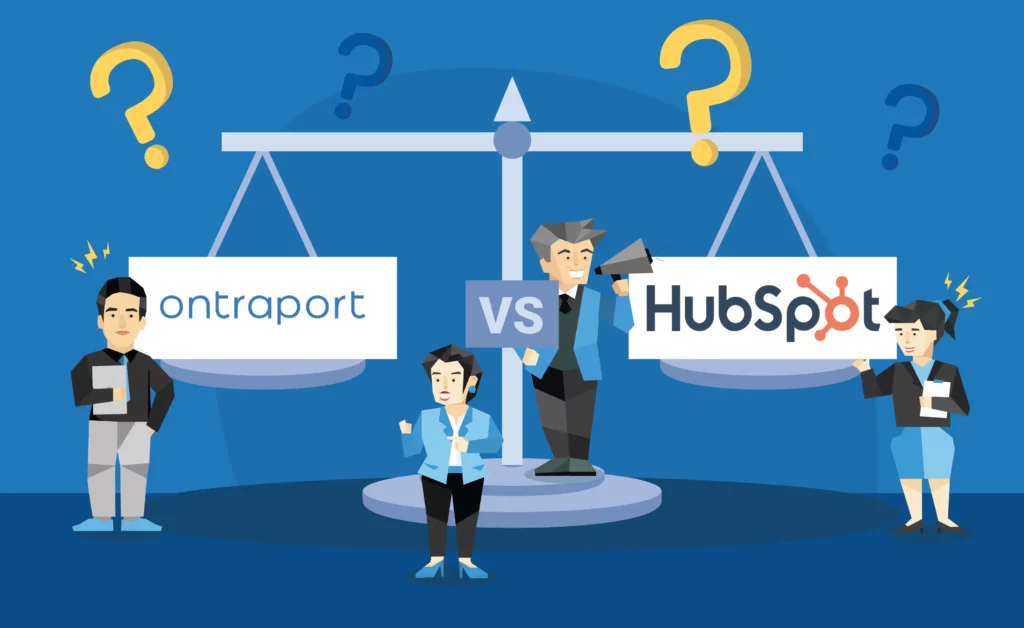Looking At HubSpot For Your Real Estate Business?

There are plenty of helpful inbound marketing tools out there that make life easier for building online marketing campaigns, creating content, engaging customers, analyzing data, and closing sales. However, one tool, in particular, stands out from a crowded field: HubSpot. HubSpot is an inbound marketing, sales, and service solution that is particularly effective for real estate businesses and one that you should strongly consider implementing.
Why Realtors Need Inbound Marketing
If your real estate business has been around for a while, you’re likely more than a little familiar with the ins and outs of traditional marketing, such as billboards, TV commercials, newspaper ads, or flyers sent through the mail. While these can be effective, inbound marketing can help you cast a wider net to increase your audience and find new clients. Inbound marketing is typically a more cost-effective, long-term approach to advertising.
So how exactly does inbound marketing work, and how is it different from traditional “outbound” marketing? Instead of presenting yourself to an audience (such as by running a commercial on a local TV station), you’re putting your business in a position to be found by potential clients on their own time. For example, by having a website that anyone can visit, without inbound marketing, you’re limiting yourself to a smaller audience at a higher cost. You’ll find yourself falling behind the competition if it hasn’t happened already.
Some of the more specific reasons why you should implement inbound marketing as part of your real estate business’ overall marketing strategy include:
Online Presence
When somebody needs information of any kind, the first place they turn is the Internet. If they need a real estate agent or are merely doing a bit of basic research on real estate in the area, they’re going to look it up online. In the past, buyers and sellers alike would have used traditional means. According to the National Association of Realtors (NAR), only 22 percent of homebuyers look through the newspaper to find homes listed for sale, while eight percent turn to friends and family for help. In 2018, almost 44 percent of homebuyers went online to look up properties for sale before doing anything else.
However, homebuyers still use real estate agents. Homebuyers worked with real estate agents 87 percent of the time in 2018. Keeping these numbers in mind, it’s no surprise that 90 percent of real estate firms have websites and that many of these websites have property listings. So if you expect your real estate business to thrive, an online presence, whether it’s a website or a social media page (or both), is a must. Inbound marketing allows you to build up your online presence so that when homebuyers and sellers begin doing research online for real estate or realtors in your area, you’ll be easier for them to find.
Better Targeting Focus Means Better Returns
One of the limitations of traditional outbound marketing is that it’s hard to target a specific audience. There’s no guarantee that by running a commercial for your real estate business on TV that it’s going to be seen by people who need a real estate agent. The same goes for putting up a billboard on the highway. You can only hope that out of the hundreds or thousands of people that might see it, that some of them may actually need your services. It’s like casting a net in the ocean with the hopes of catching a specific type of fish, but not even being sure that this type of fish lives in the area you’re fishing.
Inbound marketing can target specific audiences in a variety of ways. You can create ads on social media that target particular demographics, or produce content that you know your audience wants to read/watch. Additionally, you can use relevant keywords as part of an SEO (search engine optimization) strategy to help attract your target audience via search engine listings. Online data provided by your leads, as well as visitor behavior data, can help you better identify and understand your target audience, which, in turn, will make it easier to target them.
As a result of being able to target your audience more effectively through inbound marketing, the money you put towards your marketing efforts will go a long way. Traditional marketing already tends to be more expensive as it is. In contrast, inbound marketing can still be effective with a limited budget. You’ll find that your marketing efforts will be more cost-effective, as inbound marketing will likely yield a higher ROI over the long run than outbound marketing.
Build Trust With Relevant Content
Creating content is an essential inbound marketing strategy. If you do even the slightest bit of research into inbound marketing or online marketing, you’ll come upon the phrase “content is king” over and over again. Not only does content help drive traffic, but high-quality content helps establish your business as an authority on the topic of real estate.
There are many first-time homebuyers and home sellers out there who don’t have a clue how to get started. They are looking for information that’s relevant to their desire to buy or sell a house. By publishing content on your blog, on social media, or through a newsletter (just to name a few potential channels) that addresses their questions and concerns, you’ll build trust. Essentially, you’re giving them advice for free, which shows that you care about informing them without expecting anything in return. The higher quality your content is and the more relevant it is to your readers, the more trust they’ll have in your business, making them more likely to contact you for your services.
Nurture Relationships
One thing that’s important to understand about your prospects is that not everybody is ready to buy a house or sell their house right away. They might be entertaining the thought, which means that they may do a little bit of research online without actually committing. Via inbound marketing, you can build relationships with these leads by nurturing them with your email newsletters. By providing them with regular content that is relevant to their specific needs, you help to not only keep them informed and educated about the process, but you also help to keep your real estate business at the top of their minds. Once they decide to move forward, they’ll remember you and reach out to your real estate business as a result.
Introducing HubSpot
HubSpot is a free inbound marketing solution (with extra features available at an added cost) that countless businesses across all kinds of industries rely on to successfully market their brand. As a realtor, you might think that you know a thing or two about marketing (it’s part of the job to advertise properties on behalf of your clients, after all). While you might, you’ll quickly find that HubSpot significantly improves your ability to market your services and to find new clients as a result. HubSpot offers many robust features that can integrate with the other software solutions you’re currently using.
What HubSpot Will Do For You
Now that you have a pretty good understanding of what inbound marketing is and how it can benefit your real estate business, you’ll want to know why you should choose HubSpot over another platform. HubSpot is a comprehensive set of marketing, sales, and service tools and can easily integrate with your existing systems and apps. However, here are some of the ways that HubSpot can specifically help improve the inbound marketing efforts of your real estate business:
Track Your Sales Leads
HubSpot’s CRM (customer relationship management) software allows you to collect and organize the contact information of your leads and customers, so you can track their online behavior in real-time. This feature makes it easier to customize your marketing campaigns to address the specific needs of your leads and customers. For example, the information that they provide or the pages on your site that they visit may indicate where they are looking to buy property, which then allows you to tailor your messaging to improve your ability to engage with them.
Automated Stand-Alone Sales Platform
In addition to the HubSpot Marketing platform, HubSpot also has a free stand-alone sales platform that allows you to track all of your clients. The platform makes it easy to organize and manage all of your sales data by automatically creating a log of sales activities and by syncing all of your lead data in one place.
HubSpot also offers a useful feature called the Deal Dashboard that visualizes the sales pipeline for every customer, so you can keep track of how deals are progressing. Although not real estate-specific, you can format the Deal Dashboard pipeline to suit your needs. For example, you can break down deals into different stages, such as inquiries, property viewed, offer to purchase, contract sent, and closing stages.
Maintain Your Customer Database
HubSpot CRM makes it easy to collect and organize all of your prospect and client data, including not only their personal information but also their interactions with you. Your team can easily access the information of a client or prospect at a moment’s notice while they are engaging with them, making all of their interactions seamless. It also makes it easier to nurture your prospects in general.
- Access History Of Activity Per Prospect
Using the HubSpot CRM, you’ll be able to track past conversations with all of your prospects and clients, including phone calls, text messages, online chat messages, and emails. This feature makes it easy to see what their needs are at a glance and can help you improve your customer service. Having access to previous interactions can help you avoid asking repetitive questions.
- Log And Track Emails
In addition to tracking past conversations, you can also set up notifications for when prospects and clients open and read the emails that you’ve sent. This way, you have an idea which emails are more effective than others and allows you to see whether your prospect or client’s interests overlap with the content you’re sending out. Knowing when to follow up is made easier since you can log and track emails as well.
Create And Manage Campaigns For Property Listings
Because it’s so easy to find listings online, buyers will often begin looking for a home by doing simple searches within their desired location. Listing the properties of any sellers that you are representing online makes them easy to find. HubSpot allows you to create and manage campaigns for your property listings that can significantly improve your ability to attract and nurture potential leads and prospects. Here are some of the useful features HubSpot provides to real estate agents who want to improve the effectiveness of their property listings online:
- Personalize and Automate Emails
As a real estate agent, you receive a lot of emails from potential sellers and interested buyers, as well as from current clients. You’ll need to respond to these emails quickly. Many prospects and clients will also sign up to your email newsletter (if you have one, which you should). Because so much of your success depends on your ability to manage and send out emails, HubSpot’s ability to personalize and automate your emails comes in handy.
Using HubSpot, you can customize email templates to create a more personal interaction. You’ll also be able to segment your prospects and customers so that you only send out relevant content; for example, you don’t want to send out an email providing information on a new property listing to a seller. Email automation is also available. Automation allows you to schedule email newsletters to be sent out on certain days at certain times so that you don’t have to do so manually. You can also set up automated responses to repetitive inquiries. - Click to Call
Adding calls-to-action to your property listings is a must. You want to encourage interested parties to get into contact with your real estate business, after all. However, traditional calls-to-action invite leads to send an email, fill out a form, or call your business at a given phone number. All of these take some effort to do. HubSpot allows you to implement a click-to-call feature, which is incredibly convenient for mobile users. All they have to do to contact you is to click on the phone number you’ve listed, and it will automatically dial the number for them.
Click-to-call works the other way as well — you’ll be able to click the phone numbers of your prospects in the HubSpot platform to call them directly. Simple and speedy.
- Schedule Meetings with Ease
Time management is vital to the success of any real estate business. The ability to quickly schedule meetings and showings is an integral part of your customer service. HubSpot provides easy access to your calendar so that you can manage your schedule and set up meetings almost instantly without having to worry about double booking. The last thing you want is to make prospects or clients wait until you can find out when you’re available before adding them to your schedule.
- Work Seamlessly With Your Team
HubSpot makes it easy to assign different tasks and leads to anyone on your team and to track their progress over time. On top of that, you can provide access to your contacts, data, and email templates to every member of your team, which means that they will be able to do their jobs as effectively and efficiently as possible.
For example, if one of your team members was previously engaging with a prospect and that team member is unavailable, you can temporarily assign that prospect to someone else who will then have access to all of the prospect’s personal information and previous interactions. HubSpot makes it easy for your team to work seamlessly together.
Achieve Inbound Marketing Success With HubSpot
In this day and age, inbound marketing is essential to the success of a real estate business. Take advantage of the inbound marketing tools available to you to create and manage successful inbound marketing campaigns. Several tools match the usability and features offered by HubSpot, and the free version of HubSpot is highly effective, especially when compared to other free inbound marketing platforms. By using HubSpot, you’ll improve your ability to convert more leads and stay in touch with all of your prospects and clients.









